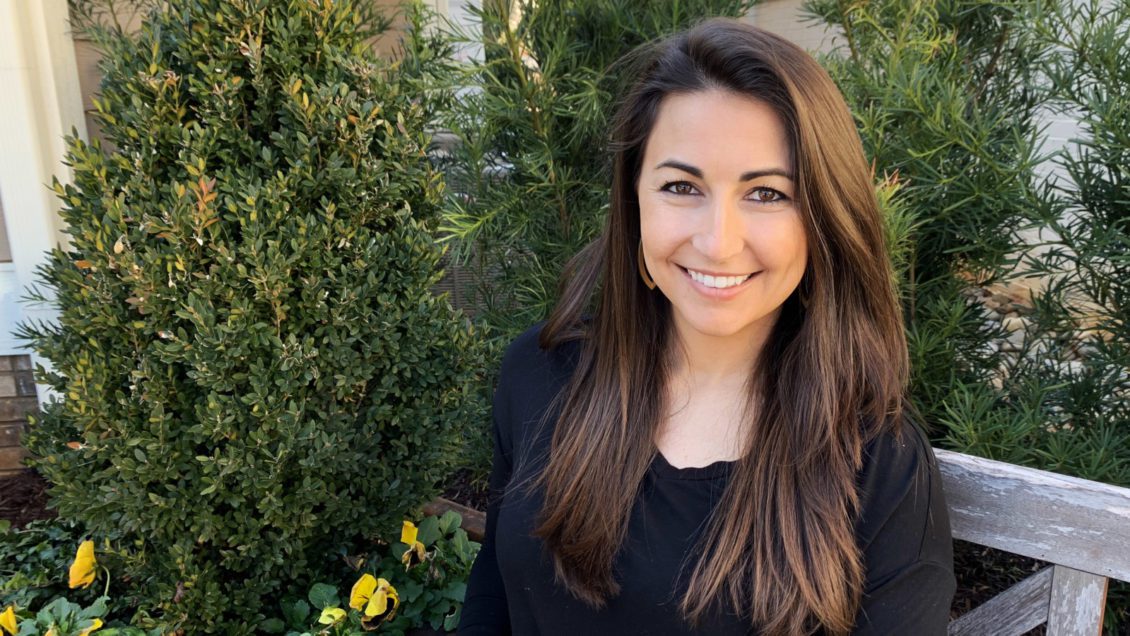
There’s a reason Elizabeth McAfee became the go-to teacher during recess for students who needed to talk about their emotions or managing their anger. A well-developed sense of empathy is in her blood. Her father is the fourth-generation McAfee to serve as director of Thomas McAfee Funeral Homes, so she didn’t just grow up around grief. She has been surrounded her entire life by people who make their livelihoods dealing with other people’s emotions effectively.
With this background in mind, it’s becoming clearer to her in hindsight why she stepped away from teaching—not necessarily education—in order to pursue a career as a mental health counselor. McAfee realized that while she enjoyed her work environment, she wasn’t necessarily doing the correct thing in it.
As an alumna of Clemson’s College of Education, McAfee knew that she would want to come back to Clemson to pursue her master’s degree in clinical mental health counseling. She said the program is giving her the tools to more effectively do what she has been drawn to her entire life, whether she realized she was being pulled in that direction or not.
“I’ve always been that person that wanted to help or wanted to fix things for people in the long term,” McAfee said. “I think it’s why as a teacher I treated bad behavior a little differently. I never labeled a student as a ‘bad kid;’ I always saw a kid acting out as a cry for help.”
McAfee didn’t dislike teaching, and she certainly didn’t dislike the school systems in which she worked, the bulk of which was with Ellen Woodside Elementary School in Greenville. She thrived on the interpersonal dynamic with students. However, by the end of the 2017-2018 school year, she knew she needed to make a change that would allow her to concentrate more on addressing issues with students that went beyond academics.
She said she feels her time as a teacher will make her a better counselor, as the lessons she learned building resilience in students and empowering them will translate well to any mental health counseling career. Returning to Clemson’s College of Education was a no brainer for McAfee, and not just because she was happy with the undergraduate degree she had attained there years earlier.

“I had a friend who went through the clinical mental health counseling program, and they told me how engaging the professors were throughout the program,” McAfee said. “I need that interaction to excel, and it certainly didn’t hurt that after comparing programs no one came close in terms of quality.”
According to David Scott, associate professor in Clemson’s education and human development department, McAfee has already shown her willingness to work with clients from any background and to treat them as individuals. He said her background as a teacher has afforded her a high level of comfort during her field experiences in schools.
“Elizabeth is a true advocate for her clients and the field of mental health,” Scott said. “She exhibits a strong knowledge base of clinical interventions, and I think her understanding of mental health issues in schools has allowed her to easily and successfully collaborate with teachers, students, parents, counselors and administrators.”
Clemson faculty aren’t the only ones impressed with McAfee’s progress in the field thus far. She was encouraged by Scott to apply to the John H. Magill School Mental Health Certificate program, an initiative that seeks to build a well-qualified work force to support the expansion of school-based mental health services in the state. Based on McAfee’s essay and her previous work in schools, she was accepted into the program.
The South Carolina Department of Mental Health has a goal to have mental health professionals available in every school by 2022. As of late 2019, the organization said nearly 40 percent of schools in the state do not have a mental health clinician. According to Scott, the need for mental health services has never been greater; he said that currently the ratio for school counselors is 300 students per school counselor in grades 6-12 and 800 students per school counselor in grades K-5.
“The faculty in the counselor education program were so excited when we heard Elizabeth was selected to participate in the certificate program,” Scott said. “The program aligns so well with the many standards of our counselor education program, and it will give Elizabeth so many unique opportunities.”

Those opportunities include clinical experiences provided by the Department of Mental Health clinicians, treatment team meetings and experience at the Southeastern School Behavioral Health Conference. McAfee said the certificate program is allowing her to network with students from across South Carolina higher education institutions and giving her a concentrated focus on interventions in school-based settings.
She said these experiences have in many cases confirmed many of the suspicions she had as a teacher in how to positively affect students and their families. This includes the importance of the team approach that schools need to take to support each child and how easily that approach falls apart when counselors and teachers don’t effectively communicate.
McAfee said she’s looking forward to completing her graduate degree and the certificate program so that she can get to work helping people, whether that’s inside or outside of a school setting. She said that if she’s learned anything through the program, it’s that to be an effective counselor she’ll have to continue being an effective educator.
“I look forward to empowering families, not just students, and that all happens when everyone—students, parents, teachers—are educated,” McAfee said. “I was often surprised how responsive some parents could be once they learned what families and teachers can accomplish when they work together. Now I realize they just needed to learn to improve the family system to then improve their child’s experience in schools.”
To learn more about our graduate programs in school counseling, click here.
END
Get in touch and we will connect you with the author or another expert.
Or email us at news@clemson.edu

